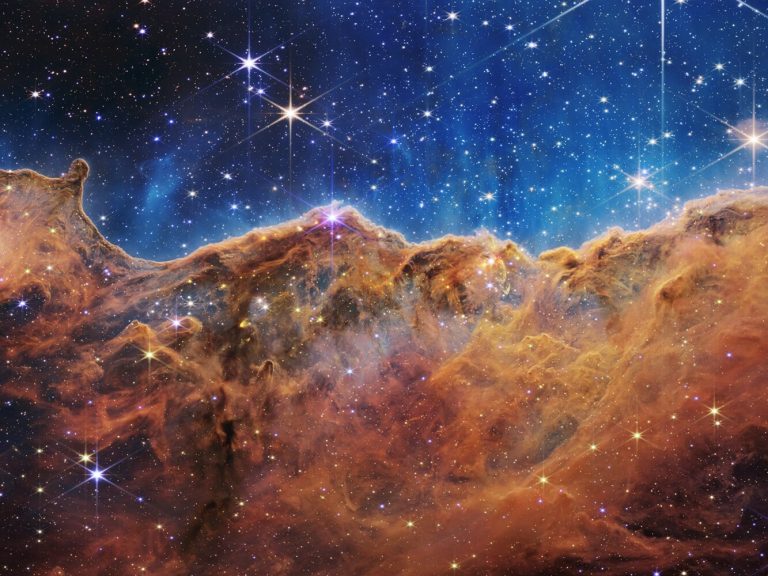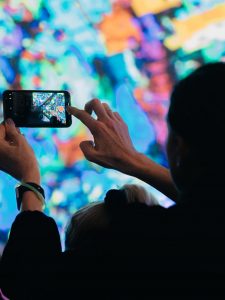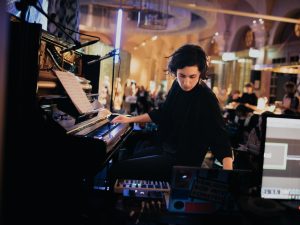Sold out!
Become a member of the museum and get priority for ticket booking, free or discounted admission to our upcoming concerts, talks, tastings and events.
Science Today takes the temperature of science in 2022 and invites you to a new kind of afterwork/after school. Here, doctoral students and postdocs get the chance to present their research on stage. After the talks, we continue with a networking mingle in the bar with music that stimulates the brain!
The concept looks into the world of science and creates an opportunity for PhD students, researchers and other enthusiasts with an interest in scientific research to meet and discuss!
After our first meeting The complexity of the brain, we will now dive deeper into the infinity of space. Where is space research today?
The Nobel Prizes related to space has gone from the very largest to the very smallest. From the question of how stars are born and shine, to the smallest particles that cross the Earth. 2019 physics laureates Michel Mayor and Didier Queloz discovered the first exoplanet – a planet outside our solar system – orbiting a solar-type star. Since then, over 4,000 exoplanets have been found in the Milky Way. The 2020 Nobel Prize in Physics went to discoveries about one of the universe’s rarest phenomena in space, black holes. Roger Penrose showed that general relativity leads to the formation of black holes, and Reinhard Genzel and Andrea Ghez discovered that something invisible and extremely heavy controls the orbits of the stars closest to the center of our galaxy. A supermassive black hole is the only known explanation.
The evening’s program is conducted in English. After the conversation on stage, the evening continues with a networking mingling, a good opportunity for new ideas and contacts to take shape.
Science Today is a collaboration with Karolinska Institutet, the Royal Institute of Technology and Stockholm University
The evening’s speakers are doctoral students and postdoctoral students from the Karolinska Institute (KI), the Royal Institute of Technology (KTH) and Stockholm University (SU).
KI
Dr Julien Record, PhD, postdoctoral fellow
The role of gravity on the immune system
“I work as a postdoc in the Immunodeficiency group (Lisa Westerberg lab). My main research interests are mechanisms of the cell cytoskeleton dynamics and how it controls immune cell functions in health and disease. I’m particularly interested in dysregulation of immune cells leading to immunodeficiency diseases and lately, the role of gravity on the immune system.”
KTH
Henriette Trollvik, PhD, department of space and plasma physics
The sun continuously emits a stream of charged particles called the solar wind. As the solar wind moves out in the solar system, it interacts with the planets. Luckily, Earth is protected by its magnetic field, shielding us from most of these energetic particles. In modern times we have been able to study space in much more detail thanks to advanced satellite missions. In my research, I use the observations from these satellite missions to try and understand some of the phenomena we can observe in the solar wind, and how they affect our planet.
SU
Nushkia Chamba, postdoctoral fellow at The Oskar Klein Center and Department of Astronomy
Nushkia use’s long exposure, deep images to study the faintest outskirts of galaxies. Her work sheds light on galaxy formation and evolution, dark matter and its connection to the limits of star formation in galaxies beyond the Milky Way. She represents Stockholm in various large, international collaborations such as Vera Rubin Observatory Dark Energy Science and Galaxies Science Collaborations. She also bring’s her research and experience closer to the global scientific community via mentorships and events at her past institutes and universities abroad.
Tonight’s program
17:00 DJ Evelina Nässen
18.00 Conversation on stage
18.45 Discussions
19.00 Networking mingle and DJ Evelina Nässen
Before and after the conversation, you are welcome to visit our exhibitions and Bistro Nobel for a glass of bubbly or snacks. See our evening menu here.
To purchase tickets, see below. There will be no refunds once tickets are purchased.
Nights at the Nobel Prize Museum / Membership
You are invited to share experiences beyond the ordinary when the Nobel Prize Museum stays open late every Friday evening with events that will appeal to all the senses. They will include literary conversations, music, concerts, science talks, tastings and workshops. Read more about our Friday nights in the programme calendar here.
As a member of the Nobel Prize Museum, you have a discounted price on some tickets and can enjoy free admission to many other activities for one year.
Read more about membership here.
Welcome to a stimulating Friday evening at the Nobel Prize Museum.


